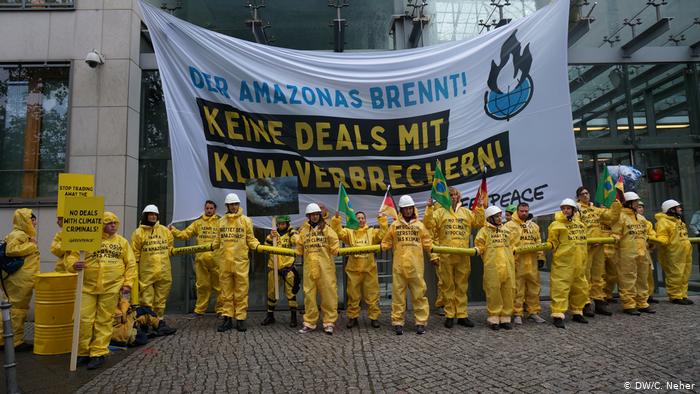RIO DE JANEIRO, BRAZIL – Environment Minister Ricardo Salles left Germany on Wednesday, October 2nd, without securing any concession from Federal Chancellor Angela Merkel’s government on the issue of the suspension of an amount of R$155 (US$39) million for forest conservation projects in Brazil.
In August, in the midst of the fires crisis, Svenja Schulze, Germany’s Environment, Nature Protection, and Nuclear Safety Minister, announced the freezing of funding, arguing that Jair Bolsonaro’s government’s policy on the Amazon “is unclear as to whether it is still pursuing a consistent reduction in deforestation rates”.

At the time, the suspension of the funds prompted a furious reaction from Bolsonaro; the Brazilian president suggested that Merkel “take this money” to “reforest Germany” and said that Brazil “doesn’t need it”.
However, during his trip to Germany, Salles attempted to minimize Bolsonaro’s statements in order to retrieve the funds. In an interview published on Tuesday by the conservative newspaper Frankfurter Allgemeine Zeitung (FAZ), the minister said that Brazil is indeed interested in German funding and that the president’s speech was only a reaction “to a demonstration by Europe”. “We will not mix politics with technical issues,” he said.
On the same day he met with Minister Schulze. The meeting produced no photos or the release of a joint statement, as is usually the case in meetings with senior foreign representatives. Ultimately, Salles left without regaining the funding.
According to a German ministry spokesman on Wednesday, the cabinet does not intend to review its position on the suspension of funding until “we have a well-founded belief that the money will be well invested”.
According to the spokesman, the meeting between Salles and Schulze was more of an exchange of views than a meeting with practical results. “Minister Svenja Schulze made her position very clear and called for the protection of the Amazon”.
Also on Tuesday, Salles met with Minister Gerd Müller of the German Development Cooperation Office. The Brazilian government has also been having a tug-of-war with this ministry, this time regarding the future of the Amazon Fund, the billion-dollar forest protection program that relies on resources from Norway and Germany.
For the time being, however, Müller’s portfolio has been refraining from following the example of the German Environment Ministry and has not yet suspended any transfers to the fund.
On the other hand, the Germans and Norwegians are not hiding their dissatisfaction with the unilateral changes promoted by Salles in the program’s governance, such as the abolition of two committees, which occurred in the absence of any agreement with the Europeans.
The two European countries also took a stand against a proposal by the Brazilian minister to use the fund’s resources to compensate farmers who are occupying environmental protection areas, and publicly rejected Salles’ insinuations about alleged frauds in the program’s management. In August, Norway suspended a new transfer of R$133 million to the fund in response to changes made by Brazil.
In his interview with newspaper FAZ, Salles once again tried to be conciliatory, in contrast to his criticism of the Amazon Fund in recent months. “The aim is for the fund to be able to distribute money again,” Salles said.
According to German government sources, the Brazilian minister sought to convince Germany to mediate a solution with the Norwegians. But a spokesman for Müller’s portfolio pointed out that Salles’ request was apparently unsuccessful. “We are waiting to see how the negotiations between Brazil and Norway will go,” he said.

On Tuesday, Angela Merkel also spoke about how her government has been addressing the issue of funds for environmental projects in Brazil. Avoiding criticism of Brazilians, she said that “there is a need for discussion. “If a good solution is found, certainly the bilateral funds can be channelled back,” said the head of government.
Protests
Salles spent three days in Germany. He arrived in the European country on Sunday, with the aim of “demystifying” a “sensationalism” of information that “is inaccurate” about the Brazilian environmental situation, he said. Before landing in Germany, he also completed rounds in the United States and France.
In Germany, he was greeted with a protest on his first day of commitments. On Monday, dozens of activists from the German arm of Greenpeace organized a demonstration in front of the headquarters of the German Confederation of Chambers of Industry and Commerce (DIHK), in the center of the German capital, protesting the Brasilian’s visit.
Initially, Salles’ agenda – which had been leaked last week by Greenpeace – suggested that the minister would meet with representatives of major German industries, including the chemical group giants Basf and Bayer, known for their production of agrochemicals.
On Tuesday, he was once again the target of a protest, this time outside the German Ministry of Cooperation and Development.

